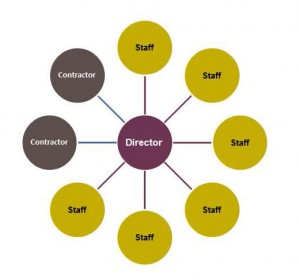 Hub-and-spoke vs. point-to-point.
Hub-and-spoke vs. point-to-point.
Which system do you work under?
It’s not top of mind for most of us.
However, we should pay attention. The system affects the speed, cost and quality of our work.
Each system has its advantages.
If you’re an airline or an old school manager, you generally like hub-and-spoke. As a manager, you always know what’s going on because all the staff members connect to you.
If you’re Southwest Airlines or a knowledge worker (or leader), you prefer point-to-point. As a knowledge worker, you go directly to the source—often your peers—to get what you need to do your job. That saves you time while connecting you to quality resources.
For example, the initial results of the open survey on peer-to-peer practices show that people like going to their peers for help.
What’s the best thing about peer support? Some survey respondents wrote:
- “Practical, real-time, no judgment.”
- “It is open and honest and no offence is taken by the comments.”
- “There are no Parent/Child relationship thrust on you and accountability isn’t ever about blame or being defensive, it’s about staying on track.”
| The survey on peer practices at work is open through Friday, August 30. Please contribute to the research—if you haven’t done so already. (And a big “Thanks!” if you have taken the survey.) This research will shed more light on the prevalence and type of peer practices and what work environments foster them. For more info, check out Practice the power of peer-to-peer. |
What could be better about peer practices? Some survey respondents wrote:
- “My employer saying this was supported.”
- “More formalization.”
- “We could be more explicit about when and how we can and are supporting one another.”
These write-in comments reminded me of a client situation from several years ago.
Nine people were working in the hub-and-spoke system pictured above–and it was by accident.
Here’s what had happened. The director was new to the company. He had inherited a staff of six individuals with a couple of contractors.
Before his first-year anniversary, he asked me to facilitate an offsite for him and his team to start planning for the next business cycle.
As part of the advance work, I conducted individual interviews of each team member to assess how things were going and their wishes for the future.
After talking with everyone, I realized they were operating as islands connected to the director and working through him. They had minimal teamwork with each other , basically just talking with one another at the monthly staff meetings.
These were all man-made islands with no master plan. They had formed without anyone fully conscious that they were working that way.
The director traveled about half the time. When he was in the office, he worked on a different floor than his team. He didn’t have any visibility in how they were working together—or not working together as the case was.
Since he hadn’t been explicit about how he expected his team members to work together, they just concentrated on their own zones of responsibility.
When I pointed out their hub-and-spoke system to the director in advance of the offsite, he had a “V-8 slap to the head” moment. It wasn’t his intention at all—especially since he didn’t want his frequent unavailability to slow them down.
Based on this, we adapted the offsite agenda. We allocated a chunk of time to talk about how to move from hub-and-spoke to point-to-point, including specific actions to take.
Within a few months of focused actions, the team members had developed new habits that included peer-to-peer support.
They also were making faster, better decisions and enjoying their work more. Even better, their internal clients were noticing and appreciating the improved quality of their work.
Their transformation to point-to-point built trust within the team and with their internal clients. The team was much better positioned to support several successful implementations of strategy initiatives starting the next year. Contact me if you want to know more.
What about you and your team? How are you taking advantage of the power of peers?

0 Comments